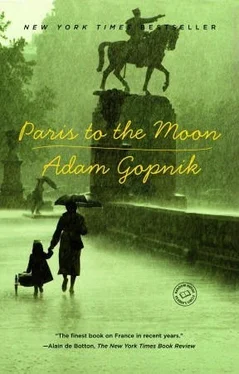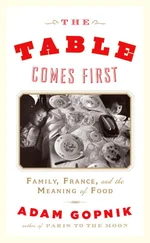After a mysterious fifteen-minute wait the attendant reemerged with the chocolate in silver pitchers and the cake—simple pound cake with lemon glaze—on silver plates and served them to the children. Ada looked bored and indifferent and demanded some more lait chaud for her chocolate, after she had tasted it. She soon had a chocolate mustache, but it didn’t make her look like a child. She looked more like Aramis, the youngest and most imperious of the musketeers.
Luke, never a big eater, watched Cressida. I saw what there was to watch: She sipped her chocolate, daintily but not as one making a big deal about daintiness. She was just a naturally elegant sipper. I drank my coffee, gulped it, really, and thought, gracelessly enough, about the bill running up. The two girls chatted in the way children do, effortlessly and seamlessly and in this case in two languages but without actually seeming to exchange information. (“You know what? You’re a Looney Tunes.” Laughter. “No, Oscar is a Looney Tunes.” More laughter, in which Luke joined.)
After the first hot chocolate had been dispensed with, Ada summoned over the waiter with a wave of her hand and said, “ Encore un chocolat chaud”— that is, “Another hot chocolate.” “Say please,” I said instantly. She gave me a steady, opaque, not-only-are-you-not-my-father-but-you-couldn’t-begin-to- afford -to-be-my-father look. But then she said please. We all went for a second round, hot chocolate and cake and bottled water, and I felt like Charlie Chaplin in The Immigrant— it had been Luke’s favorite movie, back when he would stay home all day and watch Chaplin videos while I worked—when Edna Purviance starts ordering beans and he reaches into his pocket to count his change and finds the quarter he had picked up on the sidewalk isn’t there anymore. A third round of cake followed the second round of hot chocolate—Luke left his untouched, leaving three cakes on the plate in all, which I eventually ate—and then I told Luke it was time to go.
“No,” he said definitely. And the children ran back down the stairs to the pool and played some more, dodging in and out among the chaise longues. I went over to the attendant, asked for the check, and signed it, trying to feign the nonchalance of Hem ordering another bottle of Dom Perignon for Sister Dietrich, of Dodi Fayed before his last journey.
I got him home at last, around six o’clock. Martha was mildly irascible, nursing the baby on a chaise longue near the window, all by herself all afternoon, but she melted a little when I told her the story. “You won’t believe who we met at the pool today,” I began. Luke seemed quietly happy, nonchalant. The improbability of the encounter simply hadn’t struck him. That Cressida Taylor would be swimming in a red one-piece at the Ritz pool on the same Wednesday afternoon that we were there… He had no sense of the size of the world or even of Paris. His haunts were the world’s haunts; his world was the world. This is an emotion shared, I suppose, only by children and aristocrats; everyone goes where we go. Where else would you expect to meet people? (I have none of it and in my heart always expect to be alone, the one man sitting awkwardly at a table in the wrong restaurant after everyone else has left it. When I see my wife and children coming down the boulevard to meet me, I am dazzled. The baby, Olivia, was, I could see, a little like me, constantly pulling away from her mother’s breast to give me the same anxious, reassuring smile: You of all people! Here of all places!)
For the next four weeks we went every Wednesday to the pool at the Ritz, to meet Ada and Cressida and their nanny and to swim and treat to hot chocolate and cake. Although Ada was a constant presence (“I don’t think I shall swim today,” she would say. “She’s a bit moody,” Cressida would explain, unemotionally), I could sense that a bond, a romance had begun between Luke and Cressida, in the simple sense that the unstated had emerged from the informal. I recognized the signs: It lay not in their having fun together but in their not needing to have fun together, in a quiet, you-here-me-there, however-deep-you-can-go-in-the-deep-end-I’ll-go-deeper understanding. I remembered the words that Gilberte had said to Marcel, somewhere in Proust, I think in that beautiful section titled “Place-Names: The Name,” where the two children—if they are children; I can never really figure out in Proust if they are eight or eighteen—meet at the Champs-Elysees. “Now we can begin,” Gilberte says. “You are on my side.” The two of them were on the same side too.
You are on my side. Martha and I had once always been on the same side too, and without thinking about it at all. Now, here in the city that a notion of romance, a need for one last romantic adventure, had led us to, we found that we didn’t care for each other less, yet loved each other differently. Our moving to Paris, which was intended, almost too self-consciously, I suppose, to extend that feeling—to keep each other on each other’s side without the fretfulness and noise of New York life, without dinner parties and gallery openings and Burmese takeout and the number 6 uptown for life—had had the unexpected effect of plopping us down in the same pool with the same hot chocolate to sip day after day after day, and this at a time when we both were already, so to speak, practiced swimmers. We began to take almost too much pleasure, I suppose, almost too much delight, in the passage of our son’s first romance because it recalled to us the landscape of limitations that surround all romance, the way that romance is a thing always best allied to difficulty: the water pouring into your lungs; the trombone-playing Australian looking over your shoulder and calling you into a towel; the encumbering presence of a moody hot chocolate—addicted best friend. Martha and I had always been so close; but now we were so near, and that is different.
We had run away to Paris that first time, twenty years earlier, back when we had known each other for six months, and even though it would be possible to say that that first time we were merely playing at running away, since we had families and houses waiting safely for us back in Montreal, the truth is that the existence of the families and houses was what made it, weirdly, not play at all. There really was someone back there waiting for you with a towel and calling you out of the pool, and we had decided not to listen. This time running away was a kind of play, since there was no one to run away from save ourselves, and your self always catches up.
Perhaps in the end this is why Paris is “romantic.” It marries both the voluptuous and restricted. It is not the yeses but the noes of Paris, not the licenses it offers love but the prohibitions it puts in its way, that makes it powerful. All the noes of French life, the way that each gate to each park is bounded by that endless ten-thousand-word fine-print announcement from the government announcing all the things you are absolutely not allowed to do in the park, contribute in some odd way to the romance of Paris. Strictness, rules, disciplines, boundaries dam the libido, as Freud knew, even when you are five, and make it overflow backward. It is the knowledge of how awkward your splashing feet will look to the rich women on the chaises that prevents you, tantalizingly, from kissing the mermaid’s invisible nipple.
Sometimes now, watching Martha—watching her nurse the new baby, or just lying beside her at night and watching her sleep, practically gobbling up sleep, her brow furrowed, in her new mother exhaustion—I thought that though I knew her better than I had ever known anyone, I didn’t know her now nearly as well as I had when our days were broken with the thousand small distractions of life in New York. She had been my Cressida, unique in a pool, and in Paris had had to evolve from a fantasy figure into a reality principle for a chaotic husband and a small boy and then a baby. In New York we would meet at dinner and spill out the day’s discontents, and they were always discontents with other people. Our discontents now crystallized not so much around each other—we hadn’t come to that quite yet—as around tiny things that we held each other responsible for and that each of us pursued with silent, independent fury. Instead of rebelling together against our common prohibitions, we nursed our little exasperations.
Читать дальше












